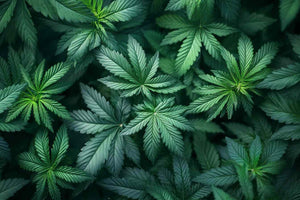In the field of plant cultivation, many people might assume that any LED light can meet the needs of plant growth. But is it true that regular household LED lights can be used as grow lights? What are the differences between regular LED lights and LED grow lights?
Of course, there are differences. Just because they both emit light doesn’t mean they function the same way.
In this article, we will explore the differences between grow lights and regular lights and answer the question, “Can any LED light work as a grow light?” to help you make the best choice.
1. Differences between grow lights and regular lights
While regular LED lights used in daily life can provide light, it doesn’t mean they are suitable for plant growth. LED grow lights and regular LED lights differ in terms of spectrum, light intensity, heat dissipation, efficiency, and lifespan, which lead to distinct performances in plant cultivation.
1.1. Spectrum Differences
The spectrum is the most significant difference between grow lights and regular LED lights.
Regular LED lights are designed primarily for human lighting, providing white light that is comfortable for our eyes, with a spectrum concentrated in the visible light range (500-700nm). These wavelengths meet human visual needs but do not necessarily support plant growth.

Plants require specific wavelengths of light:
- Blue lightpromotes leaf and stem development.
- Red lightencourages flowering and fruiting.
- UV lighthelps with sterilization and disease prevention.
- Far-red lightspeeds up flowering and growth cycles.
- Green lightpenetrates the canopy to assist in the growth of lower leaves.
In summary, grow lights are designed to meet the light needs of plants at different growth stages, ensuring healthy and fast growth.
1.2. Light Intensity: Brightness ≠ Effective Light
We often see LED lights labeled with lumens, a unit measuring brightness as perceived by the human eye. However, plants don't rely on brightness but on photosynthetic photon flux density (PPFD), which measures the number of light photons plants can use.
A regular LED light may have a high lumen value, giving the impression of sufficient light. However, its PPFD might be very low, providing insufficient light for photosynthesis. In contrast, grow lights focus on delivering the right amount of light energy for plants, adjusting intensity to suit different growth stages.

1.3. Heat Dissipation
Another key difference between regular LED lights and grow lights is heat dissipation.
Regular LED lights are designed for short-term indoor use and don't require extensive heat management. Grow lights, on the other hand, often need to run for long hours, especially during peak growth phases, sometimes for 12 hours or more a day. Poor heat dissipation can reduce a lamp's lifespan and even harm plants by overheating.
High-quality grow lights, such as the TheOneGrow plant light, feature aluminum heat sinks, which reduce heat output by 40-50%, ensuring long lifespan and stable performance.
1.4. Lifespan
While LED lights are known for their long lifespan, regular LEDs and grow lights differ significantly in this regard. Regular LED lights may last thousands to tens of thousands of hours, depending on usage and environment. However, when used continuously for plant growth, their lifespan can be drastically shortened due to inadequate heat dissipation.
Professional grow lights are designed for long-term, continuous use while maintaining stable light output. They can last up to 50,000 hours and maintain consistent light spectrum and intensity throughout their lifespan.
1.5. Efficiency
Regular LED lights, while seemingly energy-efficient and inexpensive, are not designed to provide the full spectrum of light needed for plant growth. Much of the energy is wasted on light that plants cannot absorb, with conversion rates as low as 0.7% to 2.6%. In contrast, LED grow lights are specifically designed for plants, ensuring that the light is efficiently absorbed for growth.
2. Best grow lights for large indoor plants
The 1200W Foldable grow light is ideal for indoor cultivation. It features Samsung premium LEDs with high light output (2.9umol/J) and a smart dimming system, supporting plants through their entire growth cycle. Its 1.8-meter wide light coverage reduces the number of lights needed for large plants. With UL certification and a 3-year warranty, this light is designed for optimal performance.
Specifications:
- Spectrum:Full Spectrum + 660nm red light
- PPF (Light output):3480umol/s
- PAR Efficacy:9umol/J
- Size:180 x 111 x 6.8cm
3. Conclusion
While regular LED lights are cheap and widely available, they are not designed for plant growth. When comparing spectrum, light intensity, efficiency, heat dissipation, and lifespan, LED grow lights are far more effective and cost-efficient for plant cultivation than regular LEDs.
4. FAQ about grow lights and regular lights
1)Are LED grow lights expensive to run?
No, LED grow lights are energy-efficient, have long lifespans, and are relatively inexpensive to run over time.
2)Can plant growth lights be used during the day?
Yes, grow lights can be used during the day to supplement natural light when it's insufficient for plant growth.
3)What is the best wattage for LED grow lights?
The best wattage depends on the type of plant and the area being covered.
- For small plants or seedlings, 20-40 wattsis usually sufficient.
- For medium plants, 100-200 wattsis recommended.
- For large plants or dense planting areas, 200 watts or moremay be needed.

